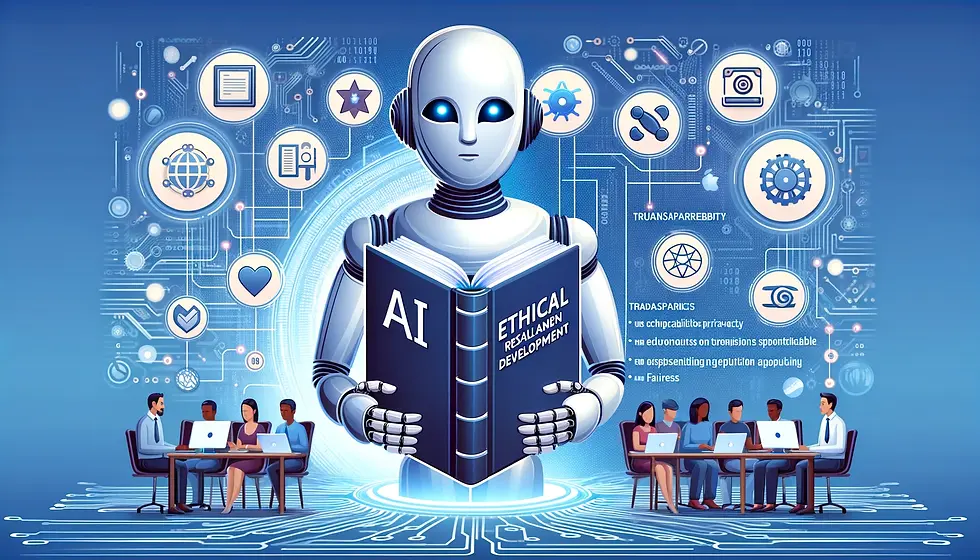How ChatGPT 4.0 is Revolutionizing Fitness for Everyone
- ERLOUISE M. VARGAS
- Jun 1, 2024
- 3 min read

Introduction to ChatGPT 4.0
ChatGPT 4.0 is the latest iteration of the artificial intelligence language model developed by OpenAI, designed to facilitate natural language interactions and provide information across various domains (Shahsavar & Choudhury, 2023). This sophisticated AI tool has proven beneficial in diverse fields, including healthcare, education, and fitness (Sallam, 2023). With its ability to process and generate human-like text, ChatGPT 4.0 provides users with personalized advice, motivation, and support for their fitness journeys (Elyoseph et al., 2023).
Benefits in Technology
The technological advancements embodied in ChatGPT 4.0 make it an invaluable tool for fitness enthusiasts. Its ability to generate customized workout plans based on individual needs and goals ensures that users receive tailored guidance, which is critical for effective fitness routines (Genç, 2023). By integrating user feedback and adjusting recommendations, ChatGPT 4.0 continuously improves the quality of its suggestions, providing a dynamic and responsive training partner (Washif et al., 2024).
Moreover, the AI's capacity to offer real-time assistance and motivation can help users maintain consistency in their fitness routines. This feature is particularly useful for individuals who struggle with self-discipline or need regular encouragement to stay on track with their fitness goals (Ajlouni et al., 2023).
Benefits in Health
In the realm of health, ChatGPT 4.0 plays a significant role in promoting well-being through accessible and reliable information. The AI's ability to offer advice on nutrition, exercise routines, and lifestyle changes can lead to improved health outcomes for users (Saadati, 2023). For instance, users can query ChatGPT 4.0 for meal plans tailored to their dietary preferences and fitness goals, which helps in making healthier food choices and managing weight effectively (Temsah et al., 2023).
Additionally, ChatGPT 4.0 can support mental health by providing users with strategies to cope with stress and anxiety. The AI's empathetic responses and suggestions for mindfulness practices contribute to overall mental well-being, which is crucial for maintaining a balanced lifestyle (Bahrini et al., 2023).
Benefits in Sports Performance
For athletes and fitness enthusiasts focused on sports performance, ChatGPT 4.0 offers a wealth of resources. The AI can design sport-specific training programs that enhance strength, agility, and endurance, helping athletes achieve their peak performance levels (Gilson et al., 2023). By analyzing performance metrics and providing insights on recovery strategies, ChatGPT 4.0 ensures that athletes can optimize their training and avoid injuries (McBee et al., 2023).
Furthermore, ChatGPT 4.0 can offer advice on mental conditioning techniques, which are crucial for high-stakes competitions. By helping athletes develop resilience and focus, the AI contributes to both their physical and psychological preparation for events (Szabó, 2023).
Conclusion
In conclusion, ChatGPT 4.0 represents a significant advancement in the intersection of artificial intelligence and fitness. Its applications in technology, health, and sports performance provide users with personalized and reliable support, enhancing their overall fitness experience. The integration of AI in fitness not only helps individuals achieve their goals but also promotes a healthier lifestyle. As we continue to embrace these technological innovations, the potential for improved health outcomes and sports performance becomes increasingly attainable.
Bibliography
Ajlouni, A., Almahaireh, A., & Whaba, F. A. (2023). Students’ Perception of Using ChatGPT in Counseling and Mental Health Education: The Benefits and Challenges. International Journal of Emerging Technologies in Learning (iJET). https://doi.org/10.3991/ijet.v18i20.42075
Bahrini, A., Khamoshifar, M., Abbasimehr, H., Riggs, R., Esmaeili, M., & Majdabadkohne, R. M. (2023). ChatGPT: Applications, Opportunities, and Threats. 2023 Systems and Information Engineering Design Symposium (SIEDS). https://doi.org/10.1109/SIEDS58326.2023.10137850
Elyoseph, Z., Hadar-Shoval, D., Asraf, K., & Lvovsky, M. (2023). ChatGPT outperforms humans in emotional awareness evaluations. Frontiers in Psychology, 14. https://doi.org/10.3389/fpsyg.2023.1199058
Genç, N. (2023). Beden Eğitimi ve Sporda Yapay Zeka: ChatGPT ile Yeni Ufuklar. Akdeniz Spor Bilimleri Dergisi. https://doi.org/10.38021/asbid.1291604
Gilson, A., Safranek, C., Huang, T., Socrates, V., Chi, L., Taylor, R., & Chartash, D. (2023). How Does ChatGPT Perform on the United States Medical Licensing Examination? The Implications of Large Language Models for Medical Education and Knowledge Assessment. JMIR Medical Education, 9. https://doi.org/10.2196/45312
McBee, J. C., Han, D. Y., Liu, L., Ma, L., Adjeroh, D., Xu, D., & Hu, G. (2023). Interdisciplinary Inquiry via PanelGPT: Application to Explore Chatbot Application in Sports Rehabilitation. medRxiv. https://doi.org/10.1101/2023.07.23.23292452
Saadati, S. M. (2023). The Need for More Attention to The Validity and Reliability of AI-Generated Exercise Programs. Health Nexus. https://doi.org/10.61838/hn.1.1.12
Sallam, M. (2023). ChatGPT Utility in Healthcare Education, Research, and Practice: Systematic Review on the Promising Perspectives and Valid Concerns. Healthcare, 11(6). https://doi.org/10.3390/healthcare11060887




Comments